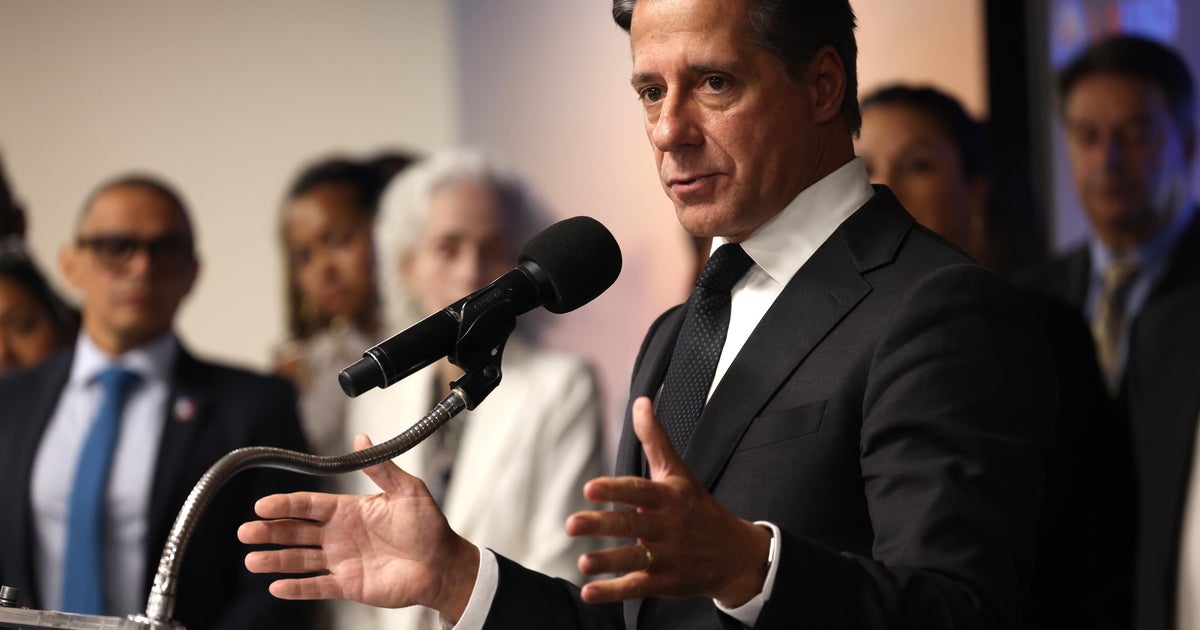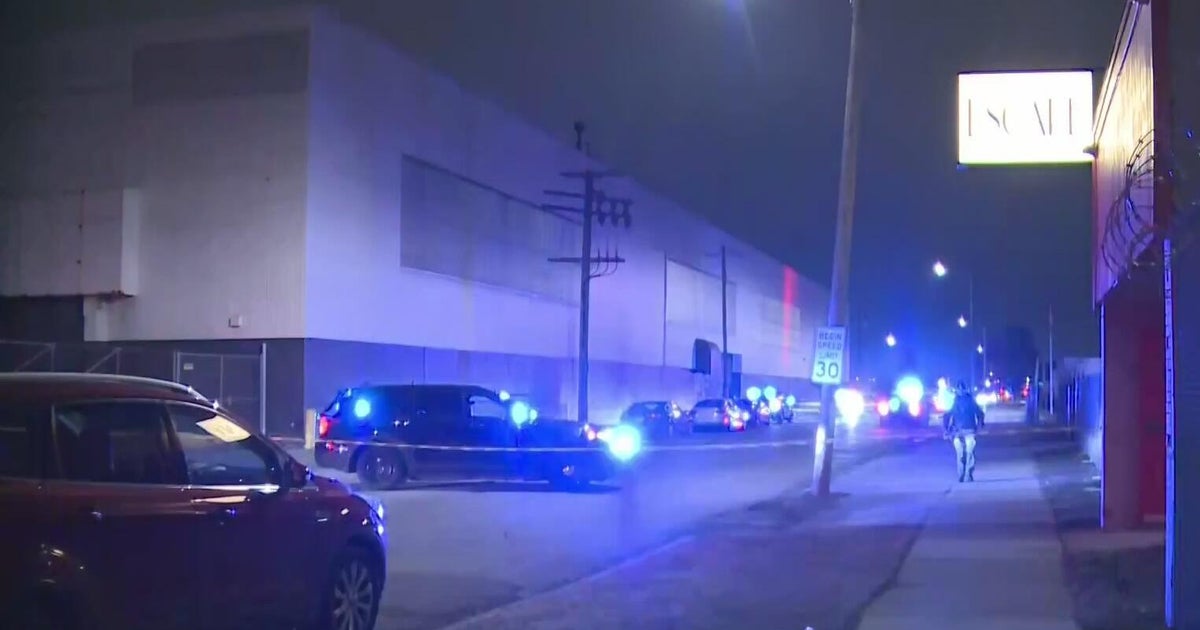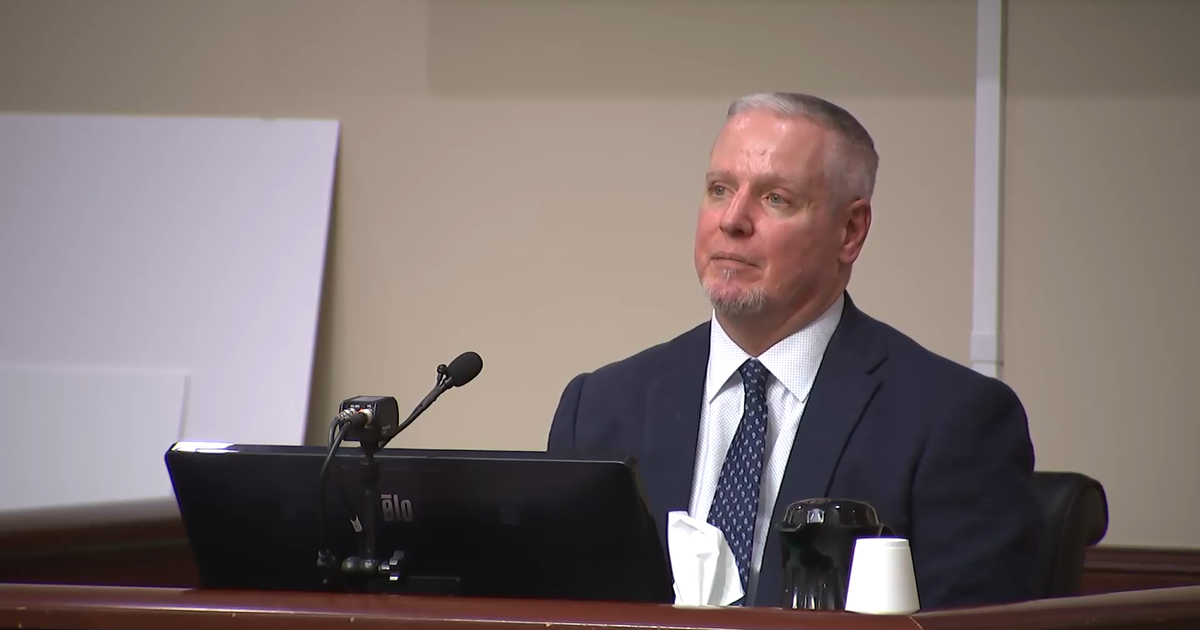Blagojevich Confronts 'Golden' Comment On Senate Seat
UPDATED 06/01/11 6:50 p.m.
CHICAGO (CBS) -- Sounding nervous and hesitant, former Gov. Rod Blagojevich on Wednesday tried to explain his most notorious comment caught on FBI wiretaps in his corruption case, but told his defense attorney he was "afraid" to do so.
On a day when the judge repeatedly scolded the defense team for their tactics in court, defense attorney Aaron Goldstein played the Nov. 5, 2008, phone call in which Blagojevich is talking about his power to appoint someone to the U.S. Senate seat that would soon be vacated by President Barack Obama.
LISTEN: Newsradio 780 Political Editor Craig Dellimore reports
Podcast
LISTEN: Newsradio 780's Bob Roberts reports
Podcast
"I've got this thing and it's f***ing...golden. … And I, I'm just not giving it up for f***ing nothing," Blagojevich said in the phone call.
Prosecutors have contended it illustrates that Blagojevich was trying to sell or trade the Senate seat for campaign money or a high-paying job.
But Blagojevich has promised a different interpretation: that he had a once-in-a-lifetime chance to appoint a U.S. Senator and he wanted to make sure he weighed all options before making a pick.
"That's the Senate seat, that's this phrase effing golden, that's been heard around the world and I was saying that this opportunity was effing golden,' Blagojevich explained from the witness stand.
But he seemed nervous when defense attorney Aaron Goldstein asked him to explain the statement.
"I'm afraid to answer this, I'd like to answer it, but I'm not quite sure how to answer it," Blagojevich said. "In my mind, I didn't know, I had no idea other than all these ideas we were throwing around. … I didn't know and that's why I was talking about it and asking questions and war-gaming and all the rest."
"I didn't want anyone, even the president-elect, to rush me into a decision," Blagojevich added. "I didn't want to give it up without discussing all ideas, good, bad, ugly whatever."
Meantime, U.S. District Judge James Zagel was clearly growing tired of the defense's tactics while Blagojevich has been on the stand, accusing them of stalling and of "smuggling" in testimony that he's previously ruled inadmissible.
At the end of the day Wednesday, Zagel accused Goldstein of stalling while Blagojevich was on the stand by asking repetitive questions, despite warnings not to do so.
"I do believe now … that you are now trying to run out the clock," Zagel said, hinting that the defense was trying to delay the prosecution's cross-examination as long as possible.
In order to stop the defense from stalling any further, Zagel said he will likely give prosecutors the chance to begin cross-examining Blagojevich early – before Goldstein finishes questioning the former governor.
Zagel said that, despite his warnings not to ask repetitive questions, Goldstein has done just that.
"There is quite clearly a question that you've asked repeatedly," Zagel said. Throughout Blagojevich's testimony, Goldstein has repeatedly asked the former governor if, on a specific day, he had made a decision about who he would appoint to the Senate seat.
Blagojevich's answer was no every time and, earlier in the trial, he had testified that he hadn't made up his mind about the Senate seat by the day he was arrested on Dec. 9, 2008.
Zagel accused Goldstein of asking similar questions several times as "a stalling tactic."
"And I don't want to see that," Zagel said.
Zagel also scolded Blagojevich for expressing opinions or bringing up topics that the judge already said should not be discussed in front of the jury.
Earlier in the day, Blagojevich had suggested prosecutors have been hiding evidence that could help his case.
At the time, he was reviewing the transcript of a recorded phone call in which he and his chief of staff, John Harris, were talking about the Senate seat.
As Blagojevich was going over the transcript, he pointed out to the jury that part of the conversation had been redacted, implying that prosecutors were hiding part of the conversation that could help his case.
Zagel sent the jury out of the courtroom and lectured Blagojevich not to make an accusation like that again.
"I think it is entirely inappropriate for him to refer to something that was minimized," Zagel said. "This is not fair."
The judge pointed out that such instances where part of a recorded conversation has been removed from the transcripts provided to the jury, it is usually because he has ruled that part of the conversation is irrelevant to the case.
"What he is doing is attempting to suggest by the back door that the government has deliberately eliminated favorable evidence." Zagel added. "This is not right and I am going to give an instruction to the jury, but I'm instructing the witness directly that he's not to refer to stuff that's been deleted on the witness stand at any time in front of the jury."
However, the judge said that if Blagojevich has a clear memory of something that was said in a recorded conversation, but that isn't included in the transcripts, he can testify about it, as long as he doesn't again accuse prosecutors of hiding evidence.
According to Blagojevich, during that phone call, he and Harris were discussing a legitimate political deal to appoint Illinois Attorney General Lisa Madigan to the Senate seat in exchange for her father, Illinois House Speaker Mike Madigan passing Blagojevich's legislative agenda in Springfield.
Among the things Blagojevich wanted Speaker Madigan to approve was an expansion of state-funded health care programs and a promise not to raise income taxes.
In the call, Blagojevich refers to the potential deal as "a carrot and a stick thing." On the stand, he explained that he believed the Madigans would benefit politically by doing "good things" for the voters, while refusing the deal would just lead to more gridlock between himself and Speaker Madigan.
"I saw it as a potentially golden opportunity to do good things for people," he said.
Judge Says Blagojevich Giving A 'Campaign Speech'
Zagel has repeatedly interrupted Blagojevich's testimony during his testimony for wandering off the topic of the questions from his attorney and for sounding more like he's giving a campaign speech than testifying in a courtroom.
"There are some things now that have been repeated for the 15th or 16th time," Zagel said. "There's a certain flavor of campaign speeches here."
The judge said he's given the defense a lot of leeway to show the jury what Blagojevich was thinking as he discussed ideas for who to appoint to Obama's former Senate seat. But he said Blagojevich has gone far enough in that regard.
"If the jury doesn't get what his position was and what his thinking by now, then they might as well go home," Zagel said. "His repetitiveness will diminish the attention span of the jury. … See if you can make his testimony more concise."
Blagojevich Denies Pressuring Union Boss Over Senate Pick
Later, Blagojevich testified that union leader Tom Balanoff, who was acting as an emissary for the Obama administration after the 2008 election, was visibly embarrassed when Blagojevich suggested getting a cabinet post in exchange for appointing Obama's adviser, Valerie Jarrett.
Blagojevich was talking about a one-on-one meeting he had with Balanoff two days after the election.
Balanoff had already testified that Obama had given him the green light to ask Blagojevich about appointing Jarrett to the Senate. Balanoff said he was a political supporter of both Obama and Blagojevich and wanted to convince Blagojevich to appoint Jarrett.
Blagojevich testified that after Balanoff suggested Jarrett, he explained his own political feud with Speaker Mike Madigan and the possibility of brokering a deal to appoint Lisa Madigan to in an effort to end the feud.
Then Blagojevich asked Balanoff about the possibility of being appointed as Secretary of the U.S. Department of Health and Human Services.
"He said you have no chance for that," Blagojevich said, adding that he could see on Balanoff's face that he was embarrassed Blagojevich asked about the cabinet post. "I felt bad for how uncomfortable he looked."
Blagojevich said he dropped the idea at that point.
"I absolutely was not conditioning one for the other because I hadn't decided what I was going to do," Blagojevich said. "I didn't know what I wanted to do then."
Blagojevich denied trying to pressure Balanoff into brokering a deal to appoint Jarrett to the Senate in exchange for Blagojevich getting the Cabinet position.
"I did not want to convey a promise to Tom Balanoff ... I floated the idea and he quickly rejected it as unlikely," Blagojevich said. "He was quick to honestly reject it as being unrealistic."
Blagojevich: Senate Seat Talks Made 'In Good Faith'
Earlier, Blagojevich began telling the jury about his early discussions regarding the Senate seat in the days leading up to the 2008 presidential election.
Blagojevich testified that all of his discussions about the Senate seat were made in good faith.
Among the first people Blagojevich consulted with about the Senate seat were his general counsel Bill Quinlan, his chief of staff John Harris and his deputy governor Bob Greenlee.
Blagojevich said that, among his initial ideas for deals he could make for the Senate seat was going to then President-elect Barack Obama to get more federal funding for Illinois in exchange for appointing Obama's preferred candidate to the Senate seat.
"We might be able to leverage that for billions of dollars of federal money for the state of Illinois," Blagojevich said.
Blagojevich testified that, early on, he and his aides developed a process to make the pick for the Senate seat by Christmas 2008.
"I was not going to allow outside forces to pressure me into a premature decision," Blagojevich said.
But Blagojevich testified that he never got around to deciding who to pick for the Senate seat before he was arrested on Dec. 9, 2008.
"I never got there," he said.
Blagojevich said a key part of the process in picking a Senator was that he and his aides would bounce a lot of ideas off of each other.
"We would collect ideas, measure one idea against the other," Blagojevich said. "We would do, when it came to these discussions and these ideas, a lot of brainstorming. … I invited and encouraged a lot of creative thinking."
Blagojevich explained that his overall "operating principle" for the Senate pick was achieving "good stuff for the people of Illinois and good stuff for me, but it's not gonna be for free."
"Good stuff for the people of Illinois came first," he added. "All these other ideas and discussions were measured against that."
But through his weeks of discussions about possible Senate picks, none of them measured up, except the possible Madigan deal.
But "we never quite were allowed to finish," Blagojevich said, a clear implication that his arrest put a stop to any potential Madigan deal.
But Zagel has repeatedly pointed out to Blagojevich's defense attorneys that they have not shown any evidence that the Madigans were involved in any discussions about a deal with Blagojevich.
Blagojevich Apologizes Again For Foul Mouth
For at least the second time since he's taken the stand, Blagojevich apologized to the jury for his use of profanity in recorded phone calls that they have heard during the trial.
Blagojevich was reviewing one of the more inflammatory phone calls that jurors have heard, in which Blagojevich goes on a tirade against Illinois voters after he'd received a poll that showed his approval rating at 13 percent.
"I f***ing busted my a** and pissed people off and gave your grandmother a free f***ing ride on a bus. Okay? I gave your f***ing baby a chance to have health care. I fought every one of those a**holes including every special interest out there, who can make my life easier and better, because they wanna raise taxes on you and I won't, I, I fight them and keep them from doing it," Blagojevich said on that call. "And what do I get for that? Only thirteen percent of you all out there think I'm doing a good job. So f*** all of you. Not to mention the fact that I'm a f***ing, criminal investigations and my family's in jeopardy."
Blagojevich explained to the jury that he was angry about his approval rating, claiming "this was a classic case of unrequited love" between himself and Illinois voters. Blagojevich began to say that he was upset that his approval rating was so low despite "fighting the establishment," but prosecutors interrupted with an objection and Zagel cut him off.
Around the same time as that phone call on Nov. 3, 2008, Blagojevich claimed he got a call from former U.S. House Speaker Dennis Hastert, who he described as a political mentor.
Blagojevich claimed that Hastert suggested he should appoint Illinois Secretary of State Jesse White to the Senate seat, referring to it as a "two-fer."
He explained that Hastert told him there would be two benefits to picking White for the Senate: he'd put an African-American in Obama's former Senate seat and then he'd get to pick White's replacement as Secretary of State.
Blagojevich said that, in the same call, he mentioned the possibility of appointing Lisa Madigan to the seat and Hastert suggested that could be another "two-fer" Senate deal: Blagojevich could pick a popular candidate for the Senate seat by appointing Madigan and then pick her successor as Illinois Attorney General.
However, Blagojevich said he wasn't ready to make any decisions yet.
"I didn't want to get rushed into a decision for Senator," Blagojevich said. "I wanted time to think through every possible idea or concept or scenario that we could think of or talk about or that came to us by the unfolding of events. I saw this as predictably the beginning of a full-court press…"
Blagojevich, 54, faces 20 counts at his retrial, including the Senate seat allegation and charges that he was trying to shake down various potential campaign contributors for cash in exchange for official actions. He has denied all wrongdoing.
At his first trial, jurors were deadlocked on all but one count, convicting Blagojevich of lying to the FBI. The prosecution later dropped three other charges in an effort to present a more concise and clear-cut case against the former governor.
Todd Feurer, CBS 2 Web Producer






